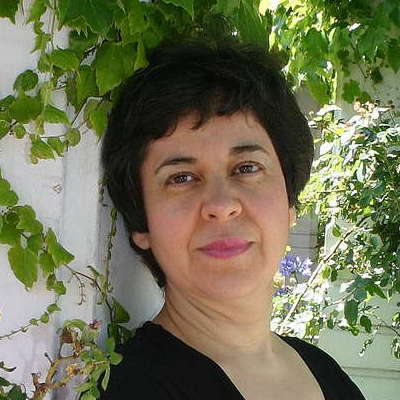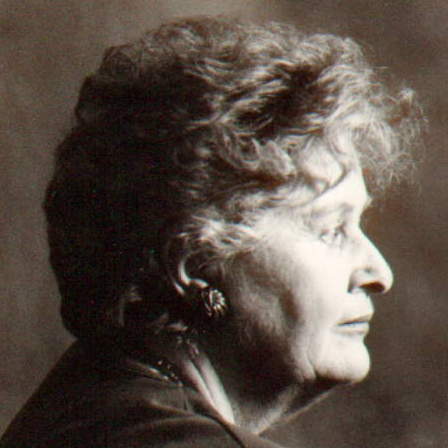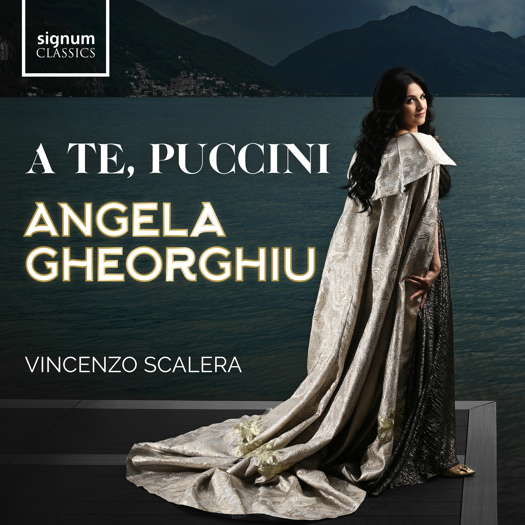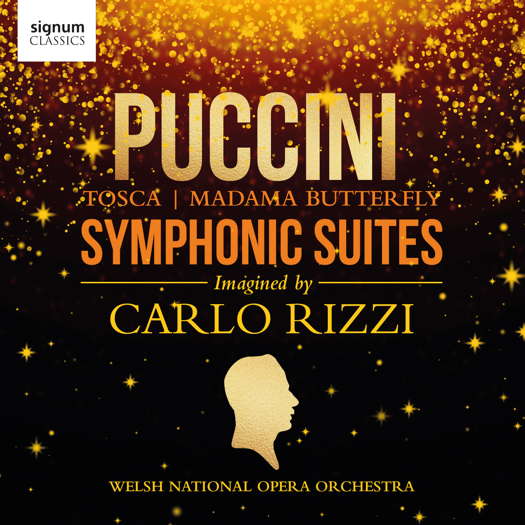 UPDATES: There's a new feature every day at Classical Music Daily. Read about the various ways we can keep in touch with you about what's happening here.
UPDATES: There's a new feature every day at Classical Music Daily. Read about the various ways we can keep in touch with you about what's happening here.
 SPONSORED: A Seasoned Champion of New Music. Argentinian-American pianist Mirian Conti in conversation with Andrew Schartmann.
SPONSORED: A Seasoned Champion of New Music. Argentinian-American pianist Mirian Conti in conversation with Andrew Schartmann.
All sponsored features >>
 SPONSORED: An Integral Part - Lindsey Wallis looks forward to the Canadian Music Centre's tribute concert to composer Roberta Stephen.
SPONSORED: An Integral Part - Lindsey Wallis looks forward to the Canadian Music Centre's tribute concert to composer Roberta Stephen.
All sponsored features >>

Sensitively Beautiful
GERALD FENECH recommends two albums from Signum Classics, marking this year's Puccini anniversary
'... an irresistible programme full of shimmering melodies ...'
Giacomo Puccini was born into a family with long musical traditions. He studied with violinist Antonio Bazzini (1818-1897) and opera composer Amilcare Ponchielli (1834-1886) and began his career writing church music. Famous for his bold and impassioned operas such as Manon Lescaut, La bohème, Tosca and Turandot which are among the most well-known and popular worldwide - he wrote twelve in all - Puccini also can be regarded as a song composer.
The appeal of his stage-work lies in the strong tragic element of the stories coupled with music that is fervently rich in melody and sublimely inventive in its harmonic language, representing the late Romantic apex of the Italian operatic tradition.
In contrast, Puccini did not seek to explore the subtleties of the song medium in the manner of his contemporaries Fauré and Richard Strauss, who were certainly more prolific in the genre than Puccini. Instead the composer, like Rossini, Donizetti, Bellini and Verdi, wanted to leave some settings which, in their pristine simplicity and emotional restraint, could hardly be more different from his operas.
Listen — Puccini: Ad una morta!
(SIGCD780 track 4, 0:00-0:47) ℗ 2024 Signum Records :
This exquisite collection presents seventeen songs for soprano and piano out of the nineteen that Puccini wrote. Some are sacred juvenilia student compositions, others are salon pieces expressly written as musical supplements for periodicals, and a few can be regarded as mature works. Although not much in number, these songs cover many themes typical of lyric poetry: life, death and personal resolution, love (separation and memories), nature and Spring, home and infancy, salutation and religious faith.
Twelve poets are represented and these include, among others, some very famous names such as Felice Romani, Antonio Ghislanzoni, Luigi Illica and Giuseppe Adami. Three of the texts are by the composer himself and one by his nephew Carlo Marsili. A sixth century Latin poet, Venantius Fortunatus, and St Luke the Evangelist also contribute to the literary aspect of these songs.
Listen — Puccini: Inno a Roma
(SIGCD780 track 15, 0:00-0:49) ℗ 2024 Signum Records :
On the occasion of the one hundredth anniversary of Puccini's death, which falls on 29 November this year, Signum Classics is proud to present one of the world's superstar sopranos, Angela Gheorghiu, in this programme of little-known songs, spanning his entire career. Described by the New York Sun as the world's most glamorous and gifted opera star, Gheorghiu's sumptuously magnificent voice is perfectly suited for this rather rare repertoire, and her renditions are as dazzling as they are enriching. Vincenzo Scolera's accompaniment is sympathetic throughout.
The programme includes a world premiere recording of the recently discovered song 'Melanconia'. Other notable pieces are 'Salve Regina' and the title track, 'A te', which Puccini composed when he was just sixteen.
Listen — Puccini: A te
(SIGCD780 track 1, 0:00-0:56) ℗ 2024 Signum Records :
That Puccini's operas can muster a huge number of recordings is certainly common knowledge, but his other compositions (symphonic, vocal and choral) have not been so lucky, and this is the very reason why I consider this issue as an invaluable addition to the composer's discography. A sensitively beautiful collection that should be snapped up without hesitation. Sound, balance and presentation are first-rate.

2024 is only a few weeks old but the 'Puccini Syndrome' seems to have caught fire already. And why not? Now I find myself again tasked with the assignment of reviewing another Puccini compilation, again from Signum.
This time the programme focuses solely on his symphonic compositions which, due to the immense popularity of his operas, are rarely programmed. The Preludio Sinfonico was written in 1882, during Puccini's time at the Milan Conservatory, and the piece shows the remarkable musical progress of its author, when compared to other Italian opera composers of his time.
Listen — Puccini: Preludio Sinfonico
(SIGCD778 track 3, 0:59-1:43) ℗ 2024 Signum Records :
The manner in which the only theme of the work is developed and varied, alternating between diatonic elements and chromaticism by means of complex harmonies, is reminiscent of passages from Massenet and of Wagner's romanticism, particularly from the Lohengrin Prelude.
Puccini knew he had composed something of substance and, later, he reused some of its melodic material in his second opera, Edgar.
The Preludio Sinfonico was premiered on 15 July 1882 at the Milan Conservatory. Later the composer decided to make some changes to the score but this recording, for the benefit of comparisons, includes both versions.
The Capriccio Sinfonico in F is the largest of Puccini's three orchestral works. It is also the last, before devoting himself entirely to opera. Composed in 1883 as the final essay of his studies at the Milan Conservatory, the piece not only provided the composer with thematic ideas for subsequent works but also gave him the chance to experiment on how to use to telling effect the harmonic language that fits that particular composition.
Listen — Puccini: Capriccio Sinfonico
(SIGCD778 track 5, 5:05-6:00) ℗ 2024 Signum Records :
The Capriccio Sinfonico is divided into two movements: an Andante moderato which acts as an introduction and an Allegro vivace which is the central nucleus of the work characterized by a great emphasis on percussion. The piece was premiered at the Milan Conservatory on 14 July 1883, and it was received by critics with considerable interest.
Still, this compilation's greatest interest should be in Carlo Rizzi's orchestral arrangements in the form of two suites of music from two of Puccini's greatest operatic hits: Tosca (1900) and Madama Butterfly (1905). What a splendid way to honour and celebrate one of the greatest operatic composers of all time in his anniversary year. Indeed, Rizzi has created new, purely orchestral versions of some of Puccini's best-known and loved melodies, whilst staying pure and faithful to the composer's original orchestration without anything added to cover any perceivable lack of vocal line.
Listen — Puccini, arranged by Carlo Rizzi: Madama Butterfly Symphonic Suite
(SIGCD778 track 1, 6:50-7:48) ℗ 2024 Signum Records :
This fabulous album of world premiere recordings is just exhilarating from start to finish. I do hope that by the end of the year Maestro Rizzi will give us other orchestral suites, say, from La bohème or Turandot. I am sure they will be welcomed most enthusiastically. In Carlo Rizzi's own words:
I hope that those who already love 'Tosca' and 'Butterfly' will enjoy the opportunity to focus wholly on the orchestra as they listen, and that people who are usually more drawn to the concert hall than to the opera house will be rewarded by exploring something new. In the end my only aim is to share and celebrate Puccini with all of them.
Listen — Puccini, arranged by Carlo Rizzi: Tosca Symphonic Suite
(SIGCD778 track 2, 19:04-20:00) ℗ 2024 Signum Records :
This is an irresistible programme full of shimmering melodies that help us to really discover Puccini's orchestral mastery which is often overshadowed by the singing and heartwrenching drama of the stories. This exceptionally innovative music that strongly enhances the total mastery of Puccini's art is not to be missed.
Copyright © 23 January 2024
Gerald Fenech,
Gzira, Malta



